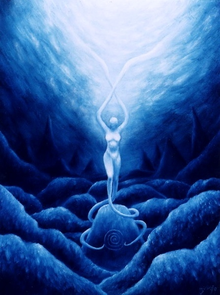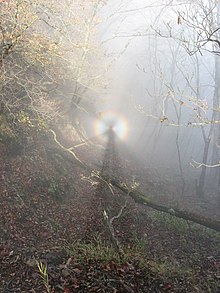Canopus in Argos
Appearance

Canopus in Argos is a sequence of science fiction novels by Nobel Prize winning author Doris Lessing, first published from 1979 to 1983, which portray a number of societies at different stages of development, over a great period of time. The focus is on accelerated evolution being aided by advanced species for less advanced species and societies.
Canopus in Argos (1979 - 1983)
[edit]
- For my father, who used to sit, hour after hour, night after night, outside our house in Africa, watching the stars "Well," he would say, "if we blow ourselves up, there's plenty more where we came from!"
- Dedication
- What a phenomenon it has been — science fiction, space fiction — exploding out of nowhere, unexpectedly of course, as always happens when the human mind is being forced to expand; this time starwards, galaxy-wise, and who knows where next.
- "Some remarks"
- This is a catastrophic universe, always; and subject to sudden reversals, upheavals, changes, cataclysms, with joy never anything but the song of substance under pressure forced into new forms and shapes.
- "Johor reports"
- All the old supports going, gone, this man reaches out a hand to steady himself on a ledge of rough brick that is warm in the sun: his hand feeds him messages of solidity, but his mind messages of destruction, for this breathing substance, made of earth, will be a dance of atoms, he knows it, his intelligence tells him so: there will soon be war, he is in the middle of war, where he stands will be a waste, mounds of rubble, and this solid earthy substance will be a film of dust on ruins.
- "Johor: Additional Explanatory Information, II,"

- So that this beautiful realm of hers was held in her mind extended, or lengthened: it had been finite, bounded, known utterly and in every detail, self-enclosed ... but now it lapped and rippled out and upwards beyond there into hinterlands that were like unknown possibilities in her own mind.
- Al*Ith
- War. Fighting. Men ... every man in the whole realm is in the army.... Every man in uniform ... An economy entirely geared to war ... but there is not much war ... hardly any fighting ... yet every man a soldier from birth till death ... Men ... all men for fighting ... but no war, no wars to fight ... what is it, what does it mean?"
- Al*Ith
- This is certainly not the place for a discourse about what festivals are for. Discussions on this theme were plentiful during that phase of preparation and on the whole were fruitless. My experience is that discussion is fruitless. What sets forth and demonstrates is the sight of events in action, is living through these events and understanding them.
- The Chronicler

- When the festival was over, that was the end of it all.
And I do not think I am being fanciful when I say that this was at least partly because it had already taken place — but elsewhere. After all, this story of Al*Ith has taught us all that what goes on in one Zone affects the others, even when we believe we are hostile, or forget everything that goes on outside our own borders. We share and exchange our times of sluggishness, insularity, self-applause. When those women stove and struggled to lift their poor heads up so they could see our mountain towering over them it was as if they were secretly pouring energy and effort into springs that fed us all.- The Chronicler
- Anyone could clutch at a child and mark its features: "This nose is mine, and that his, and that my mother's, and that his father's ..." Anybody, even a horse or a dog, could calculate streams of inheritance in that way. And all that was pleasant enough, and of course no one would refuse the delights of watching for the appearance of this or that trait in a child. But that was not even the half of it ... one might not, most definitely could not, say of a child, "mine, mine," or "ours, ours," — meaning, only, parenthood. For what was real and fine and precious in this new being was in relation only with ... somewhere else ...
- Al*Ith

- What are all these guises, aspects, presentations? Only manifestations of what we all are at different times, according to how these needs are pulled out of us. I write in these bald words the deepest lessons of my life, the truest substance of what I have learned. I am not only a Chronicler of Zone Three, or only partially, for I also share in Al*Ith's condition of being ruler insofar as I can write of her, describe her. I am woman with her (though I am a man) as I write of her femaleness — and Dabeeb's. I am Ben Ata when I summon him into my mind and try to make him real. I am ... what I am at the moment I am that.
- The Chronicler
- Yet there is a mystery here and it is not one that I understand: without the sting of otherness, of — even — the vicious, without the terrible energies of the underside of health, sanity, sense, then nothing works or can work. I tell you that goodness — what we in our ordinary daylight selves call goodness: the ordinary, the decent — these are nothing without the hidden powers that pour forth continually from their shadow sides. Their hidden aspects contained and tempered.
- The Chronicler
- There was a continuous movement now, from Zone Five to Zone Four. And from Zone Four to Zone Three, and from us, up the pass. There was a lightness, a freshness, and an enquiry and a remaking and an inspiration where there had been only stagnation. And closed frontiers. For this is how we all see it now.
- The Chronicler
The Sirian Experiments (1981)
[edit]
- Why is it that writers, who by definition operate by the use of their imaginations, are given so little credit for it: we "make things up." This is our trade. I remember, before I myself attempted this genre of space fiction, reading an agreeable tale about a species of highly intelligent giraffes who travelled by spaceship from their solar system to ours, to ask if our sun was behaving cruelly to us as theirs had recently taken to doing to them. I remember saying to myself: Well, at least the writer of this tale is not likely to get industrious letters asking what it is like to be a giraffe in a spaceship.
- Preface
- What of course I would like to be writing is the story of the Red and White Dwarves and their Remembering Mirror, their space rocket (powered by anti-gravity), their attendant entities Hadron, Gluon, Pion, Lepton, and Muon, and the Charmed Quarks and the Coloured Quarks. But we can't all be physicists.
- Preface
- I did not lose my Sirian perspectives, the Sirian scope of time and space. But I was inside, too, this civilisation's view of itself as all there was of the known world — for on its edges were, to the north, the threatening horsemen, to the northwest, very far away, dark forests full of barbarians whom these people scarcely accounted as human at all, believing them not much more than beasts — and from their point of view, accurately — ... The world as understood by this great and powerful Queen was, though it stretched from one end of the main landmass to the other, circumscribed indeed, and the stars that roofed it were understood only — and to a limited extend — by their influences on their movements ... on our movements ... an odd, a startling, a disturbing, clash of focusses and perspectives encompassed me; and as for the historical aspect, this queen knew the story of her own civilisation and some legends, mostly inaccurate, of a "distant" past, which to me, and my mind, was virtually contemporary with her.
- Ambien II, "The Horsemen"


- When a generation watches the young ones, their future, their responsibility, grow up, and when what they are to inherit is pitiful and so reduced, then the shame of it goes too deep for reasoning. No, it was not our fault that our children had to learn such hardship, had to forego so much that we, the older ones, had inherited. Our fault it was not; but we felt that it was. We were learning, we old ones, that in times when a species, a race, is under threat, drives and necessities built into the very substance of our flesh speak out in ways that we need never have known about if extremities had not come to squeeze these truths out of us. An older, a passing, generation needs to hand on goodness, something fine and high — even if it is only in potential — to their children. And if there isn't this bequest to put into their hands, then there is a bitterness and a pain that makes it hard to look into young eyes, young faces.
- Doeg
- In a universe that is all gradations of matter, from gross to fine to finer, so that we end up with everything we are composed of in a lattice, a grid, a mesh, a mist, where particles or movements so small we cannot observe them are held in a strict and accurate web, that is nevertheless nonexistent to the eyes we use for ordinary living — in this system of fine and finer, where then is the substance of a thought?
- Doeg
- We looked down at a glassy glittering icy place many days walking across and very deep, between enormous icy black peaks. All we looked at had a glassy awfulness that hurt into our dying eyes; and as we peered down over the edge of the miniature valley we were stranded in at the top of the mountain peak, we knew we would never leave it. How could we, weak as we were, descend the ghastly precipices of that peak? And so, for the last time with our old eyes, we sat close and looked into each other's faces, until, one after another, our faces shuttered themselves in death, and our bundles of bones settled inside the heaps of our shag-skin coats, so that, as we slid away from that scene, and saw it with eyes we had not known we possessed, all we could see was what looked like a herd of beasts crouched in sleep or in death high up there on a mountaintop.
- Doeg

- But what these had been, our peoples, our selves — were with us then, were us, had become us — could not be anything but us, their representatives — and we, together, the Representative, at last found the pole that was the extremity of our old planet, the dark cold pole that had been built, once, to guide in the space-fleets of Canopus, when they visited us. There we left that planet, and came to where we are now. We, the Representative, many and one, came here, where Canopus tends and guards and instructs.
- The Representative
- What lies behind facts like these: that so recently one could not have said Scott was not perfect without earning at least sorrowful disapproval; that a year after the Gang of Four were perfect, they were villains; that in the fifties in the United States a nothing-man called McCarthy was able to intimidate and terrorise sane and sensible people, but that in the sixties young people summoned before similar committees simply laughed.
- Afterword
- It seems to me that we do not know nearly enough about ourselves; that we do not often enough wonder if our lives, or some events and times in our lives, may not be analogues or metaphors or echoes of evolvements and happenings going on in other people? — or animals? — even forests or oceans or rocks? — in this world of ours or, even, in worlds or dimensions elsewhere.
- Afterword
- In fact, it is no longer possible for them to think of war except in terms of uniforms. This mental set now infects every aspect of their lives. There is a certain type of covering for the lower limbs, in thick, unyielding cloth, always of the same color, and very tight, emphasizing the buttocks and the genitals. It is not only worn in every corner of the "Empire," but has spread to the near planets of Sirius as well. A young person who for some reason or another does not own this garment will regard himself or herself as an outcast, and will be so regarded by others.
- From Klorathy, in Vatun on Volyen, to Johor
- It can be considered a rule that the probable duration of an Empire may be prognosticated by the degree to which its rulers believe in their own propaganda.
- Klorathy in Vatun to Johor
Quotes about Canopus in Argos
[edit]
- Mechanistic science is concerned above all with order. Despite changing conceptions of the domain and scope of scientific investigation, one constant for scientists throughout the nineteenth century and into the twentieth was their common ambition to articulate the laws (preferably expressed in mathematical equations) behind various material phenomena. A corollary assumption — perhaps the most distinctively nineteenth-century contribution to the mechanistic tradition — is the belief that all phenomena possess such regularities. … Mechanistic science's legacy for the late twentieth century consists not only in a handful of methodological practices that have endured with the scientific community, but also in an array of widely disseminated assumptions about knowledge, strategies for organization, and conceptions of an ideal order. … the Canopus novels incorporate a drive for factual plenitude, which may or may not yield an underlying meaning or order, and an assumption of cosmic regularity, which may or may not be empirically accessible … the Canopus novels operate on the principle of defamiliarization. By amalgamating the history of the earth into the fictional cosmos of Canopus, Sirius, and Shammat, the novels critique current modes of thought and ways of doing things while at the same time offering alternatives. Yet the "otherness" of the alternative perspective does not really rest on radical novelty of vision. It derives rather from a thoroughly mechanistic assumption of uniform space-time and an observer independent of the events he/she observes. The defamiliarization is due to the narrator's distance from the events described and from his/her relative freedom from the subjective distortion that plagues Lessing's earthbound characters.
- Martha A. Turner, in Mechanism and the Novel: Science in the Narrative Process (1993) Ch. 9 : The mechanistic legacy: Lessing's Canopus in Argos: Archives

